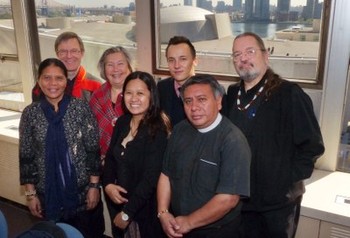Scattered throughout the recent history of Indigenous Peoples are national treaties, declarations and laws that languish in obscurity or are brushed aside and ignored.
Adding insult to injury, when many national and local churches attempt to speak out about the denial of rights of Indigenous Peoples they are told by governments that the church has no place in politics, effectively being seen but not heard.
Yet a new “outcome document” of the United Nations World Conference on Indigenous Peoples is about to turn that perspective on its head. The world’s governments are now inviting churches and other civil society groups to be seen and heard when it comes to advocating for Indigenous Peoples’ human rights.
For ecumenical representatives of indigenous faith communities who attended the U.N. conference, held in New York on Sept. 22 and 23, and other side events, the six-page outcome document is significantly lends motivation and teeth to a movement that has sought to secure the rights of Indigenous People's around the world.
The document was agreed upon by all U.N. member states on Sept. 22 and reinforces the 2007 U.N. Declaration on the Rights of Indigenous Peoples (UNDRIP), effectively turning a page where governments are concerned.
“Through the document, the nations of the world state that the well-being of Indigenous Peoples is essential to the well-being of the planet,” Bishop Mark MacDonald of the Anglican Church of Canada said. MacDonald is the first National Indigenous Anglican Bishop of Canada.
MacDonald also said that the governments agreed to a partnership with Indigenous Peoples, and the document requires the church and other members of civil society to enter into that partnership and advocate for the commitments of the document.
The document, which is essentially the governments of the world speaking to themselves, civil society and others, and to Indigenous Peoples, covers a wide swath of concerns, including ensuring basic human rights; consulting and cooperating with Indigenous Peoples when crucial economic decisions are made in their communities; providing improved access to education, health and work; empowerment of youth; addressing social needs; free and informed consent; and the development of national “action plans” inclusive of the needs of Indigenous Peoples.
Churches and Indigenous Peoples
“The church has a special responsibility both in light of its fundamental mission as a body but also its historic relationship with Indigenous Peoples,” MacDonald said.
“This is not only an affirmation of the declaration adopted in 2007, but it is a new commitment of the member states that they will now take intentional and systematic action,” the Rev. Tore Johnsen, general secretary of the Sami Church Council in Norway, said. “At least in words they are committing themselves.”
For Johnsen and his colleagues, when the states say in the document that they encourage civil society to advocate, that means the churches need “to take an active role in promoting and protecting the rights of Indigenous Peoples.”
“For the churches that also means taking an active role in holding the nation states accountable,” Johnsen said.
At the same time, he admits, “this can easily be cosmetic,” referring to one potential outcome of the document. But that need not be the case. “The church has a strong moral voice,” he said.
May Vargas of the Philippines, and a member of the ecumenical team, welcomed encouragement by the state for the church and other groups to be engaged. In her context, where there has been significant violence inflicted upon indigenous populations because of land resources, the church becomes a “sanctuary for the poor and the oppressed,” as some of the churches are doing there.
Both Vargas and Johnsen saw a clear role for the church to play in the situation of extractive industries, such as mining of minerals, oil and gas, and the situation of violence against Indigenous women and children.
In such direct and real situations, the group stated, with the support of churches and willingness of the governments to follow through, implementation of the document could have a positive impact.
“It is also important to say that this resonates very much with the World Council of Churches, which has in many instances lifted up the issue of indigenous rights,” Johnsen said. He suggested that the document opens the door for the WCC to pay “specific attention to Indigenous Peoples’ rights.”

